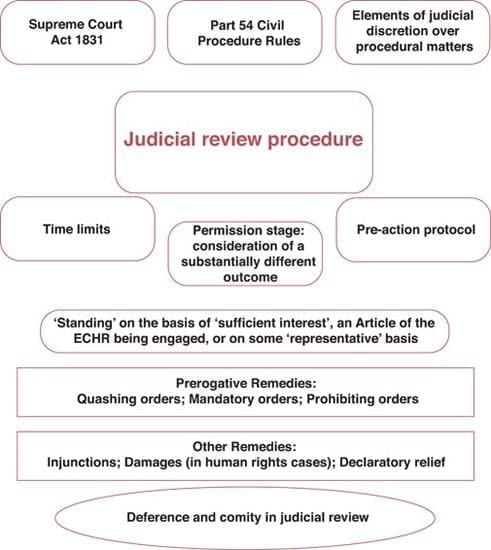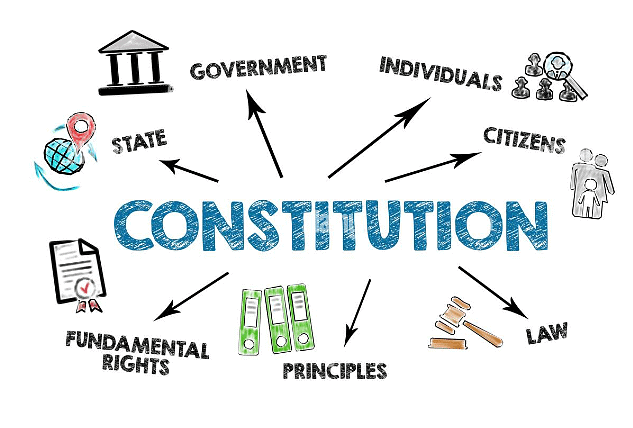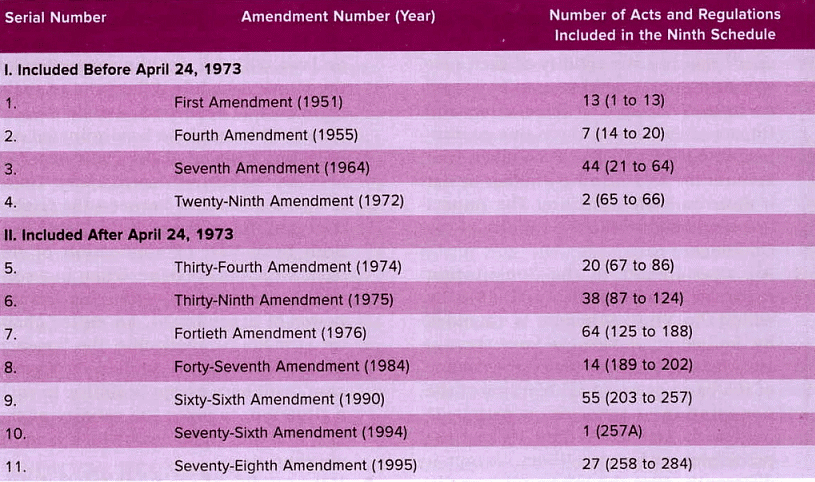Laxmikanth Summary: Judicial Review | Indian Polity for UPSC CSE PDF Download
In the realm of legal scrutiny, a judge examines the lawfulness of decisions made by public bodies—a process akin to assessing the journey, not just the destination. Judicial reviews, in essence, delve into the how rather than the right or wrong of the what.
Judicial Review
Judicial review is a process where the judiciary examines the actions of the executive, legislative, or administrative branches of the government. The court has the authority to invalidate laws, acts, or governmental actions that are found to be in contradiction with a higher authority, such as the constitution. This process is an essential part of the system of checks and balances, ensuring that all branches of government operate within their designated limits.
The scope and application of judicial review can vary significantly between different jurisdictions and legal systems. In some countries, judicial review is a well-established practice with clear guidelines, while in others, it may be more limited or subject to specific conditions.
 Judicial Review Process
Judicial Review Process
Principles of Review
- Judicial review ensures that actions by public bodies comply with the powers given by legislation.
- The principle of ultra vires is vital in judicial review, stopping actions that exceed granted powers.
- Procedural fairness is a key consideration in judicial decisions made during administrative acts under review.
Power of Judicial Review
In several instances, the Supreme Court has underscored the genuine significance of the power of Judicial Review in our country.
The court has made specific observations on this matter, emphasizing its authentic importance:-
- In India, the Constitution is supreme, requiring laws to align with its principles for validity.
- Judicial review is a key judicial responsibility that checks the constitutionality of laws, particularly those affecting Fundamental Rights.
- The judiciary acts as a vigilant guardian of these rights, as explicitly outlined in the Constitution.
- Every government branch, including the judiciary, derives authority from and operates within constitutional limits.
- Judges have the important duty of upholding the Constitution and maintaining a balance of power.
- The inclusion of judicial review provisions in the Constitution reflects the wisdom of the founding fathers.
- These provisions support federalism, protect citizens' rights, and adapt the Constitution to changing needs.
- Judicial review is an integral part of constitutional interpretation, ensuring a healthy and adaptable legal framework.
Constitutional Provisions for Judicial Review
While the term 'Judicial Review' is not explicitly mentioned in the Constitution, various Articles expressly grant the power of judicial review to both the Supreme Court and High Courts.  Constitution of India
Constitution of India
The following provisions elaborate on this authority :-
- Article 13: Declares null and void any laws inconsistent with or derogatory to Fundamental Rights.
- Article 32: Ensures the right to approach the Supreme Court for Fundamental Rights enforcement, granting the power to issue directions, orders, or writs.
- Article 131: Grants the Supreme Court original jurisdiction in center-state and inter-state disputes.
- Article 132: Provides the Supreme Court's appellate jurisdiction in constitutional cases.
- Article 133: Outlines the Supreme Court's appellate jurisdiction in civil cases.
- Article 134: Specifies the Supreme Court's appellate jurisdiction in criminal cases.
- Article 134-A: Addresses the certification for appeal to the Supreme Court from High Courts.
- Article 135: Empowers the Supreme Court with the jurisdiction and powers of the former Federal Court under pre-constitution laws.
- Article 136: Authorizes the Supreme Court to grant special leave to appeal from any court or tribunal, excluding military tribunals.
- Article 143: Allows the President to seek the Supreme Court's opinion on legal questions and pre-constitution matters.
- Article 226: Grants High Courts the authority to issue directions, orders, or writs for Fundamental Rights enforcement and other purposes.
- Article 227: Provides High Courts with the power of superintendence over all courts and tribunals within their territorial jurisdictions, excluding military courts.
- Article 245: Addresses the territorial extent of laws by Parliament and State Legislatures.
- Article 246: Deals with the subject matter of laws by Parliament and State Legislatures (Union List, State List, and Concurrent List).
- Articles 251 and 254: Resolve conflicts between central and state laws, giving precedence to central laws.
- Article 372: Deals with the continuation of pre-constitution laws.
Scope of Judicial Review
The constitutional validity of a legislative enactment or executive order can be contested in the Supreme Court or High Courts based on three grounds:-
(a) Violation of Fundamental Rights (Part III),
(b) Exceeding the authority of the framing authority, and
(c) Conflict with constitutional provisions.
Expanding Judicial Review
- The scope of judicial review in India is narrower than in the USA.
- The American Constitution, while not explicitly mentioning judicial review, relies on 'due process of law.'
- The Indian Constitution emphasizes 'procedure established by law' rather than 'due process of law.'
- 'Due process of law' in the USA grants the Supreme Court broad authority, allowing it to declare laws void on both substantive and procedural grounds.
- In India, the Supreme Court focuses solely on the substantive question of whether a law falls within the authority's powers.
- The Indian Supreme Court does not assess the reasonableness, suitability, or policy implications of a law during the judicial review process.
Judicial Review of the Ninth Schedule
The Ninth Schedule comprises a compilation of central and state laws immune to legal challenges, introduced through the enactment of the Constitution (First Amendment) Act in 1951.
Article 31-B Protection
- The Ninth Schedule protects laws from being contested on the basis of Fundamental Rights violations.
- Added by the 1st Constitutional Amendment Act of 1951.
Ninth Schedule Evolution
- Originally had 13 items in 1951, now comprises 282.
- State legislature acts focus on land reforms, while Parliament deals with various matters.
Kesavananda Bharati Case (1973)
- Ruled that acts in the Ninth Schedule are challengeable if they violate the basic structure of the constitution.
Waman Rao Case (1989)
- Clarified that acts added after April 24, 1973, are valid if they don't harm the basic structure.
- Reaffirmed that laws in the Ninth Schedule are not immune to judicial review.
- Emphasized judicial review as a constitutional 'basic feature.'
- Laws added after April 24, 1973, can be challenged in court if they violate Fundamental Rights or the basic structure of the constitution.
Conclusions from the Supreme Court Judgment:
1. Validation of Laws in Ninth Schedule- A law affecting rights in Part III may or may not violate the basic structure.
- Judicial review is invoked to invalidate such laws, considering the direct impact and effect.
2. Individual Assessment of Constitutional Amendments
- Each new constitutional amendment, following Kesavananda Bharati and Indira Gandhi cases, requires individual scrutiny.
- The actual impact on rights in Part III determines its validity.
3. Testing Amendments Post-April 24, 1973
Amendments to the Constitution post-April 24, 1973, affecting the Ninth Schedule, must be tested against the Constitution's basic features.Even if added by an amendment, laws can be challenged if they damage the basic structure.4. Justification for Constitutional Protection
- Protection for laws in the Ninth Schedule through Constitutional Amendments requires constitutional adjudication.
- Assessment includes considering the nature and extent of Fundamental Right infringement, applying the "rights test" and the "essence of the right" test.
5. Limitations on Challenging Previously Upheld Laws
- If the Court has upheld the validity of a Ninth Schedule law previously, it cannot be challenged again based on the principles declared in this judgment.
- However, laws violating Part III rights added post-April 24, 1973, are subject to challenge for damaging the basic structure.
6. Immunity for Finalized Actions
- Actions and transactions resulting from the impugned Acts are not open to challenge.
The number of acts and regulations included in the Ninth Schedule before and after April 24, 1973 are clear from the following image:- 
Note: Entries 87, 92, and 130 have been omitted by the Forty-Fourth Amendment (1978).
|
147 videos|780 docs|202 tests
|
FAQs on Laxmikanth Summary: Judicial Review - Indian Polity for UPSC CSE
| 1. What is judicial review? |  |
| 2. What is the power of judicial review? |  |
| 3. What are the constitutional provisions for judicial review? |  |
| 4. What is the scope of judicial review? |  |
| 5. What is the judicial review of the Ninth Schedule? |  |

















